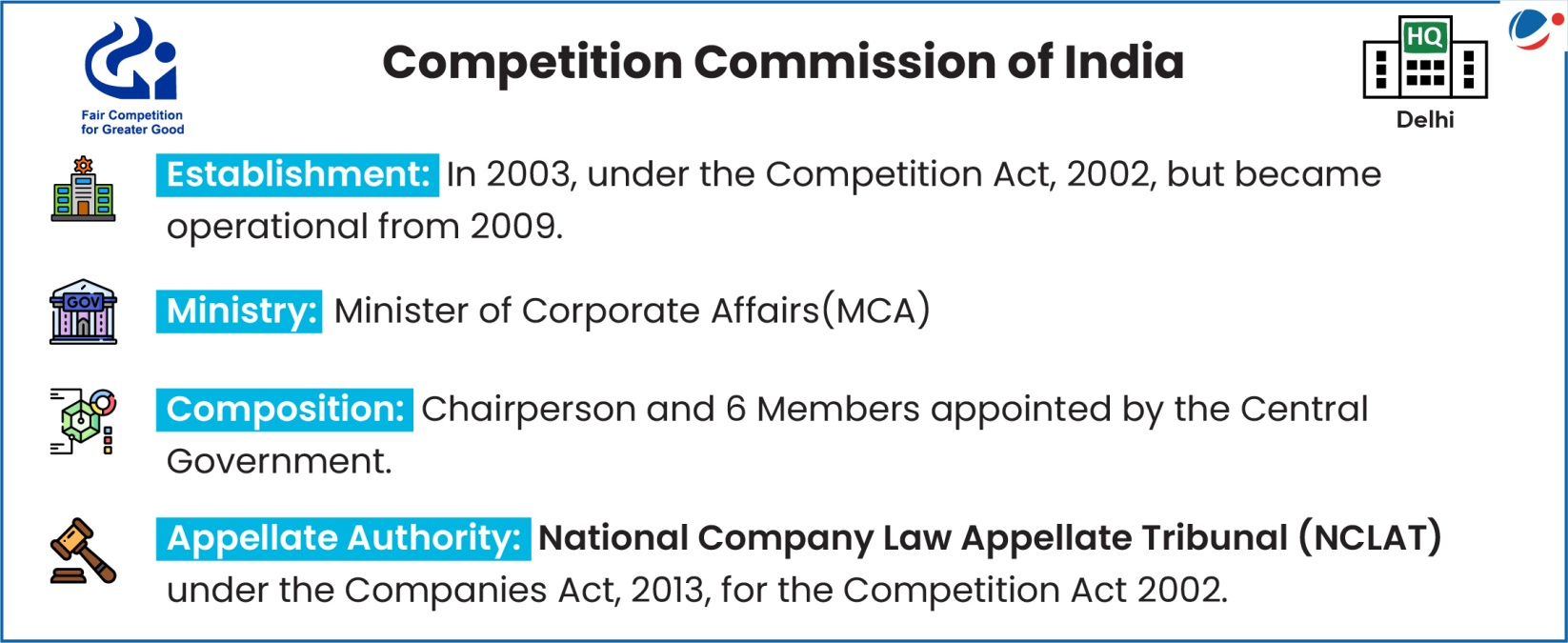Why in the News?
Recently, the Standing Committee on Finance tabled a report titled Evolving Role of Competition Commission of India in the Economy, particularly the Digital Landscape, before parliament.

Role of CCI
- Eliminate practices having adverse effect on competition: E.g., in the Umar Javeed vs. Google case, the CCI directed Google not to restrict app developers from distributing apps via side-loading.
- Side-loading means installing apps on a device from outside the official app store.
- Protect the interests of consumers: E.g., CCI fined Meta for abusing dominance by sharing WhatsApp's user data with other Meta companies.
- Advise the government on competition issues: E.g., the competition assessment toolkit by CCI to help govt. analyse laws and regulations to identify aspects that restrict competition.
- Inquire, investigate, pass orders and impose penalty on anti-competitive practices: E.g., in the Google search bias case, it imposed a Rs 135 crore penalty.
- It also has the powers of a civil court (summons, evidence, etc.)
- Regulate Mergers: E.g., it approved the Walmart-Flipkart merger after evaluating concerns such as predatory pricing, deep discounting, impact on offline retailers, etc
- Adapting to evolving challenges: E.g., Digital Markets Division (DMD) was constituted by CCI to cope up with challenges posed by digitization to fair competition
- Study technology and its impact on competition
- Assisting in work relating to the draft Digital Competition Bill (DCB), etc.
Evolving Challenges before CCI
- Digitization: it has introduced efficiencies but, has also posed significant challenges eg,
- Tech firms as gatekeepers controlling access between consumers and businesses.
- E.g., xAI filed case against Apple's exclusive integration of ChatGPT into iOS.
- Network effects: E.g., WhatsApp's 'take-it-or-leave-it' policy of 2021, compelling all users to accept data collection terms to leverage networking effect, was fined by CCI
- Data Advantage: Big tech platforms' ability to control vast amounts of user data undermines the ability of smaller firms to compete
- The European Union regulators accused Amazon of misusing data from 3rd party sellers on its platform to gain an unfair advantage in retail.
- Ecosystem dominance: E.g., Apple's ecosystem - Apple Pay, Safari browser, iCloud, Apple Music.
- Other Challenges: Self-Preferencing (platforms prioritise their own products), Predatory Pricing and Deep Discounting, Tying and bundling, etc.
- Lack of a comprehensive policy framework: National Competition Policy was prepared in 2011, but is yet to be enforced.
- Digital Competition Bill (DCB) Concerns: Broad thresholds, absence of a rebuttal mechanism, and potential overlap with the Digital Personal Data Protection Act (DPDP Act).
- Cross-Jurisdictional Issues: Cross-border digital markets and players require the CCI to collaborate with global regulators.
- Resource and Capacity Gaps: CCI faces significant human resource vacancies (only 113 out of 195 sanctioned posts filled) and, lack of specialized technical expertise (e.g., AI).
- Enforcement Effectiveness: CCI-imposed penalties (Rs. 18,512.28 crore out of Rs. 20,350.46 crore) are stayed or dismissed by appellate courts.
- Threats to MSMEs: A ₹2,000 crore deal value threshold (DVT) allows large corporations to acquire MSMEs without regulatory scrutiny.
Recent Initiatives to streamline competition
|
Way Forward (recommendations of the committee)
- Digital Competition Regulation: Use market studies (AI, etc.). Implementation of the National Competition Policy, etc.
- Learning from the best practices: Such as Digital Markets Act of the European Union which is an ex-ante competition framework, ensures that gatekeeper behave fairly online.
- A lower DVT for MSMEs: It could be considered for acquisitions involving MSMEs and proactive investigations by CCI into predatory pricing by dominant online platforms
- Ensure data access for MSMEs to compete with big digital firms.
- Institutional Capacity and Resource Gaps: Sanctioned strength of CCI must be increased, Invest in continuous training & international collaboration, etc.
- Refining Digital Competition Bill: To address certain concerns like its broad threshold.



